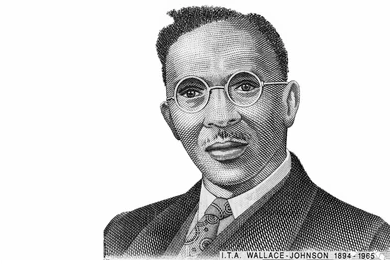By Kwadwo Agyei Yeboah (Interim General Secretary, African Continental Unity Party-ACUP)
In Africa’s long and unpleasant history of liberation struggle and rebuilding of the continent, few figures embody the spirit of radical resistance and boundless solidarity with intensity as powerful as Isaac Theophilus Akunna Wallace-Johnson. The Comrade was born in 1894 in Sierra Leone, Wallace-Johnson dedicated his life mainly to challenging colonial injustice, uplifting of the African personality, and promoting African unity for the ultimate good of all Africans. As we reflect on his life and legacy in 2025, it becomes clear that his revolutionary and positive action principles remain not only relevant but urgent in our times.
By examining the historical steps of Wallace-Johnson, one can attribute, to a very large extent, his political awakening to have been shaped by both his early experience in the British colonial system and his global exposure. He served briefly in the merchant navy, which took him across the world and exposed him to the international nature of exploitation and racism. It was during this time that he came into contact with socialist ideas and anti-imperialist thought, which would profoundly shape his later activism.
Returning to West Africa, Wallace-Johnson became a powerful voice for the working class and the poor. In 1935, he founded the West African Youth League in Sierra Leone—one of the first mass political movements in the region to openly challenge colonial authority and advocate for the rights of workers, women, and youth. He later expanded the movement into the Gold Coast (now Ghana), where he also played a key role in labour organizing and trade union activism.
Wallace-Johnson’s radicalism extended to the printed word. As a journalist, he edited and published the African Standard and the West African Sentinel, using them as tools to expose colonial corruption, racial injustice, and economic exploitation. He believed in mass education as a cornerstone of liberation, writing in accessible English and speaking directly to the people. His fiery pen and uncompromising voice earned him admiration among the masses — and relentless persecution from colonial authorities.
His political activities led to arrests, imprisonment, and exile, but he remained unbowed. Throughout the 1930s and 1940s, Wallace-Johnson built alliances with international anti-colonialists, including George Padmore and other members of the International African Service Bureau in London. His activism helped bridge African struggles with broader movements for liberation and socialism around the world.
Wallace-Johnson passed away in 1965, the same year the Organisation of African Unity adopted a firm stance against neocolonialism. He did not live to see the full unfolding of post-independence Africa, but his warnings about elite betrayal, class inequality, and foreign domination remain prophetic.
Today, as Africa continues to grapple with poverty, neoliberalism, environmental destruction, and foreign interference, Wallace-Johnson’s life offers powerful lessons. He reminds us that genuine liberation must be rooted in popular power, that the working class and the masses must be politically organized. Pan-African solidarity is not just a slogan but a necessity. We further remind ourselves of the great responsibility of rebuilding Africa. This has to be carried by all of us not just a few.
In the past, we have largely stood with folded arms, looking at the few we refer to as our great leaders to act magically to bring us liberation and the transformation we seek. We sing their praises and appreciate their sacrifices, but we hardly join them to replicate their actions with our own efforts. Unfortunately, this path of expecting Africa to be liberated by a Messiah can only lead to great men and women continuing to occupy our history books. If we genuinely want to leave behind a great African society for our children, then, we must all put ourselves up and fight for the rebuilding of Africa, just like Wallace-Johnson did. A fair society is built by committed and dedicated citizens not just by great leaders.
In honouring Wallace-Johnson, we honour a tradition of collective involvement, radical education, and people-centred politics. His example continues to inspire socialists, trade unionists, and Pan-Africanists across the continent and the diaspora. Let us take up his banner with the same courage and conviction with which he carried it in order to bring Pan-Africanism to power across Africa. For a more detailed biography see: https://en.wikipedia.org/wiki/I._T._A._Wallace-Johnson






